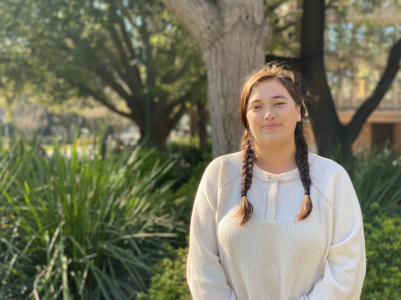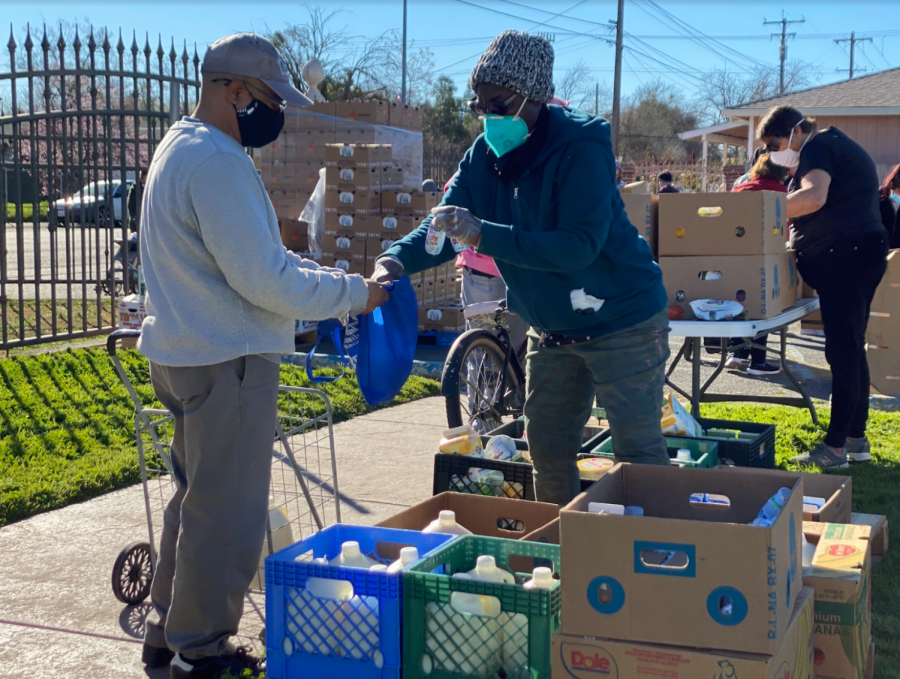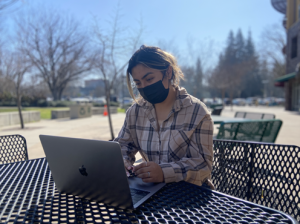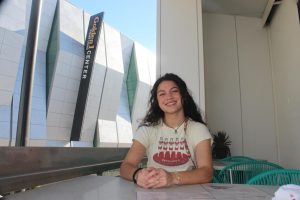Sacramento State included in College Corps $10,000 pilot program for students
Program set to launch in March
Volunteers distribute grocery items at the St. Paul Church of God-Christ Food Distribution Center in Sacramento on Wednesday, Feb. 16. Students can expect the university to send out applications in March as more information on the program is released. (Photo by Laura De la Garza Garcia)
February 26, 2022
Sacramento State has joined several other California colleges and universities in a community service program that will award $10,000 to selected students for 450 hours of community service while allowing them to earn college credit and get resume-building opportunities.
California Governor Gavin Newsom and his team announced their launch of the “#CaliforniansForAll” College Corps Program on Jan. 18. According to a press release, the program will help selected students lower college debt, earn college credit, and get involved in their community.
The program will allow students to volunteer in their community with initiatives focusing on supporting K-12 education, climate action, food insecurity, and COVID-19 relief.
After being selected for the program, students will get the opportunity to earn college credit and receive the scholarship stipend of $10,000.
The award will be split into two payments; $7,000 for housing purposes and a $3,000 stipend for academic expenses, according to California Volunteers.
Emilee Jauregui, a junior majoring in parks and recreation, said she had previously completed 600 pre-internship hours for her major. According to her, this commitment was similar to what the College Corps program requires, which allowed her very little free time.
“It was constant driving from one place to the next…very little time for anything,” Jauregui said. “I don’t know if I could get back to a scheduling routine to volunteer so many hours after already stressing out about classes.”

The College Corps program plans to group students into cohorts to complete their required service. Upon completion of the required community hours and an academic year of service, students will receive their monetary award.
“It is a really great opportunity for those who, during this time, lost their jobs or filed for unemployment,” senior psychology major Anne Randak said.
Randak works as an instructional student assistant (ISA) for her department and is currently enrolled in 12 units this semester.
She said she enjoys helping people and loves the idea of volunteering in the community, and that this program is a good opportunity since it gets people involved with their community and compensates them for their time.
“It’s a good opportunity for those who, during this time (the pandemic) lost their jobs and filed for unemployment and who are struggling to make ends meet,” Randak said.
Neelam Bandhu, a junior majoring in ethnic studies, said that she recognized that there are higher rates of student debt in the Black and Latinx community and believes this program is great for students struggling with money.
“I am really excited to apply to this program because it’ll benefit me academically and financially,” Bandhu said. “I think Gavin Newsom is doing a good thing by creating this program for students who are in need.”
According to California Volunteers, the scholarship program will be launched along with the recruitment process in March. The application process will focus on recruiting students like Dreamers, who, according to California bill AB 540, are not eligible to get federal loans or aid during their time in school because of their immigration status, as well as that considered low-income.



































































































































